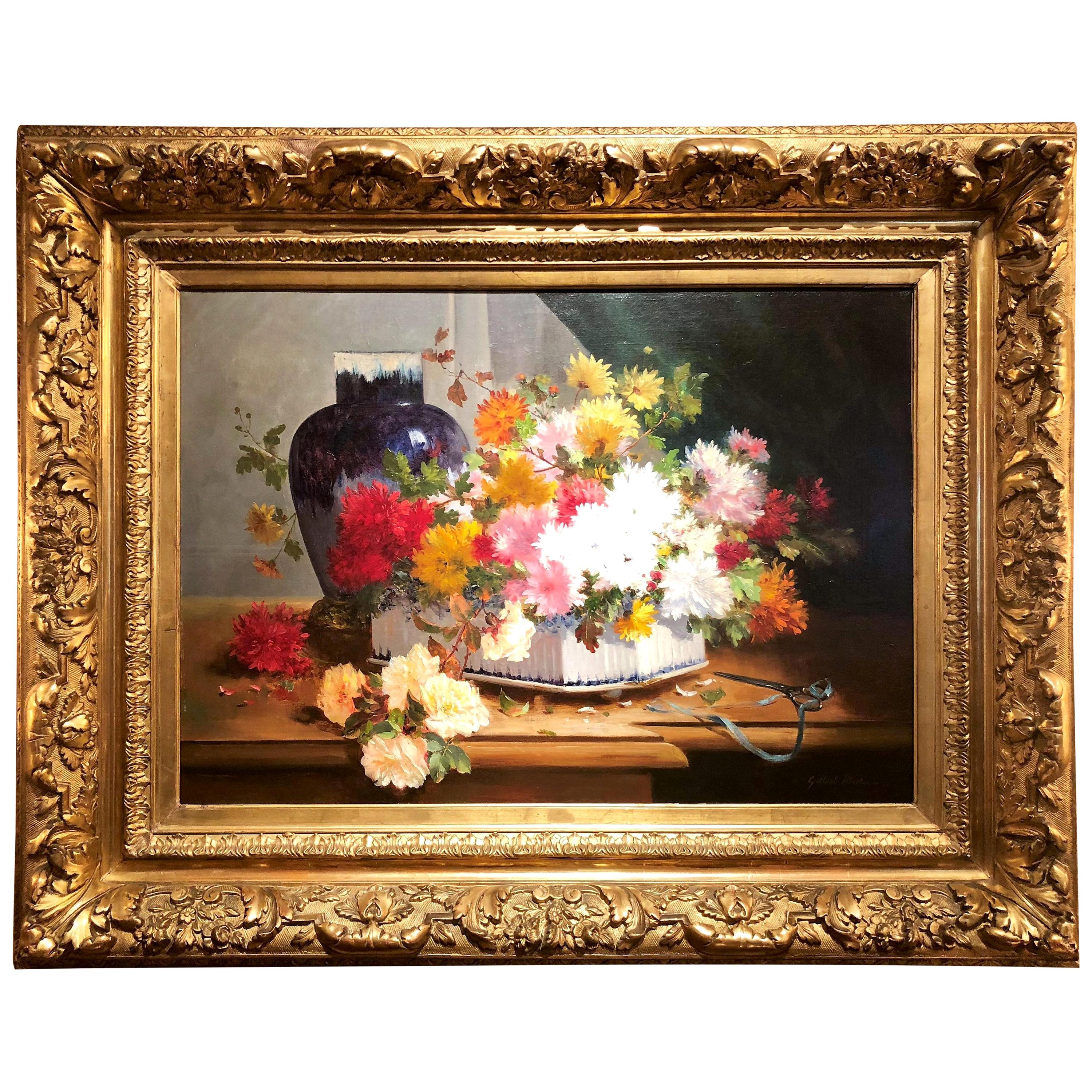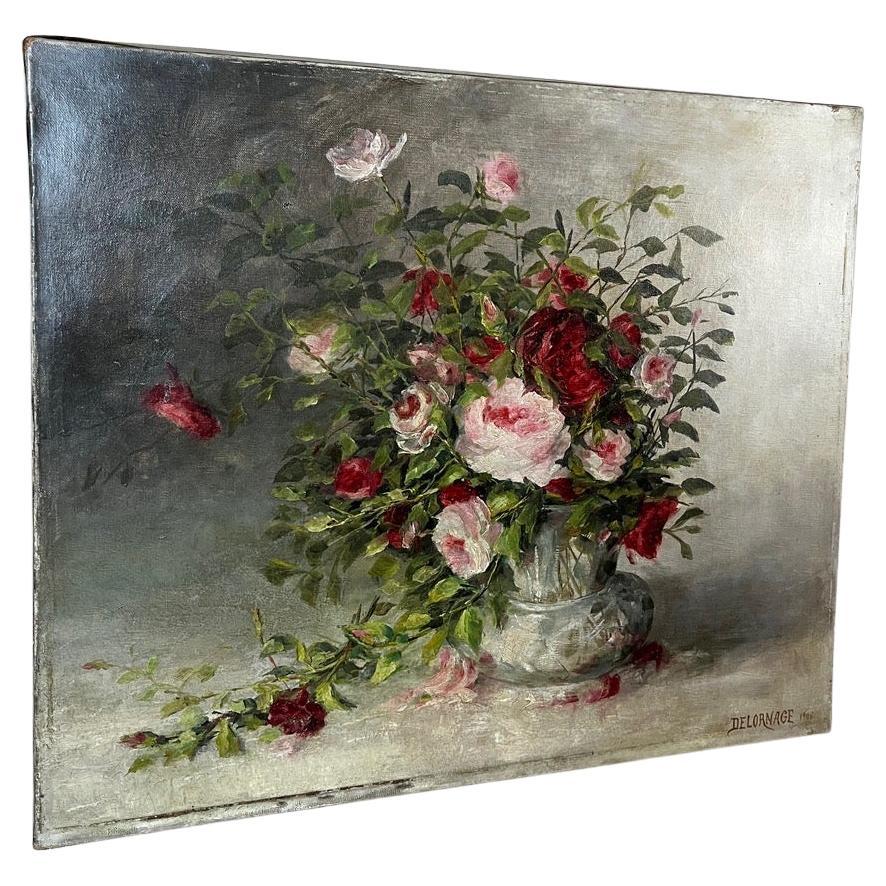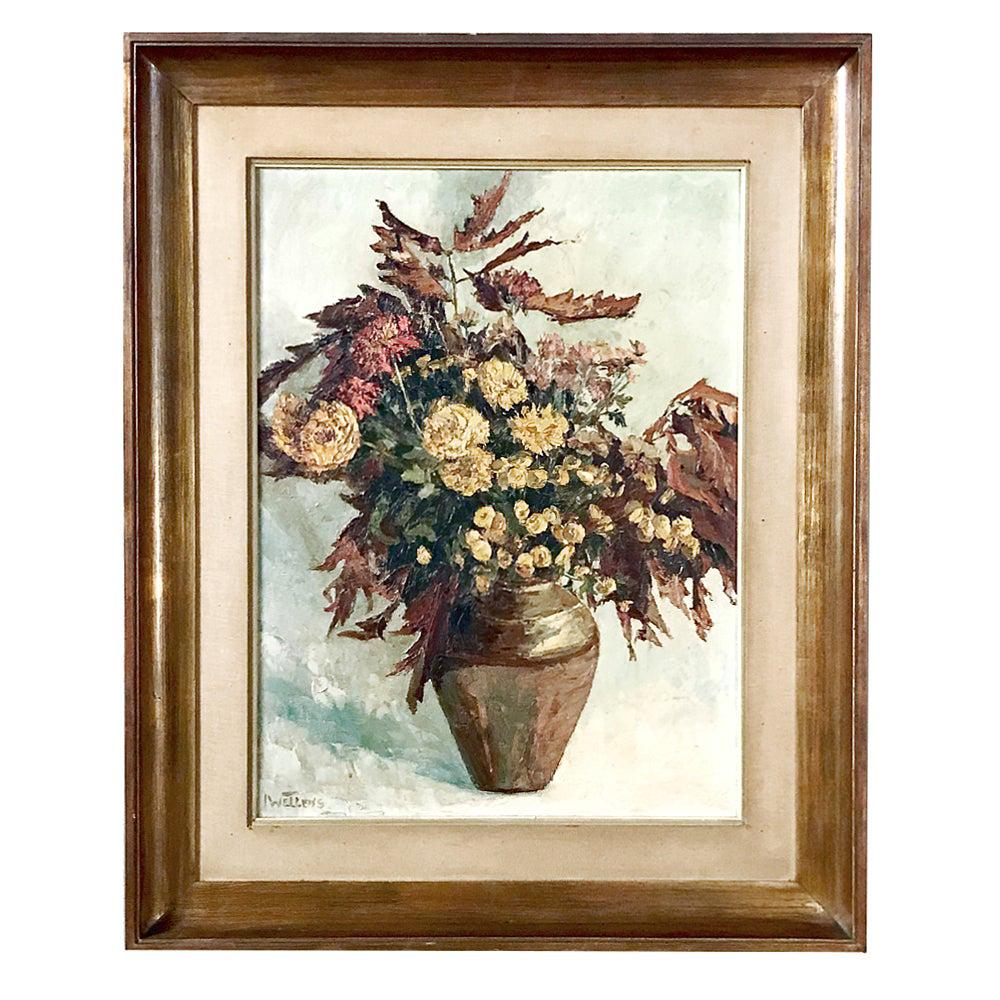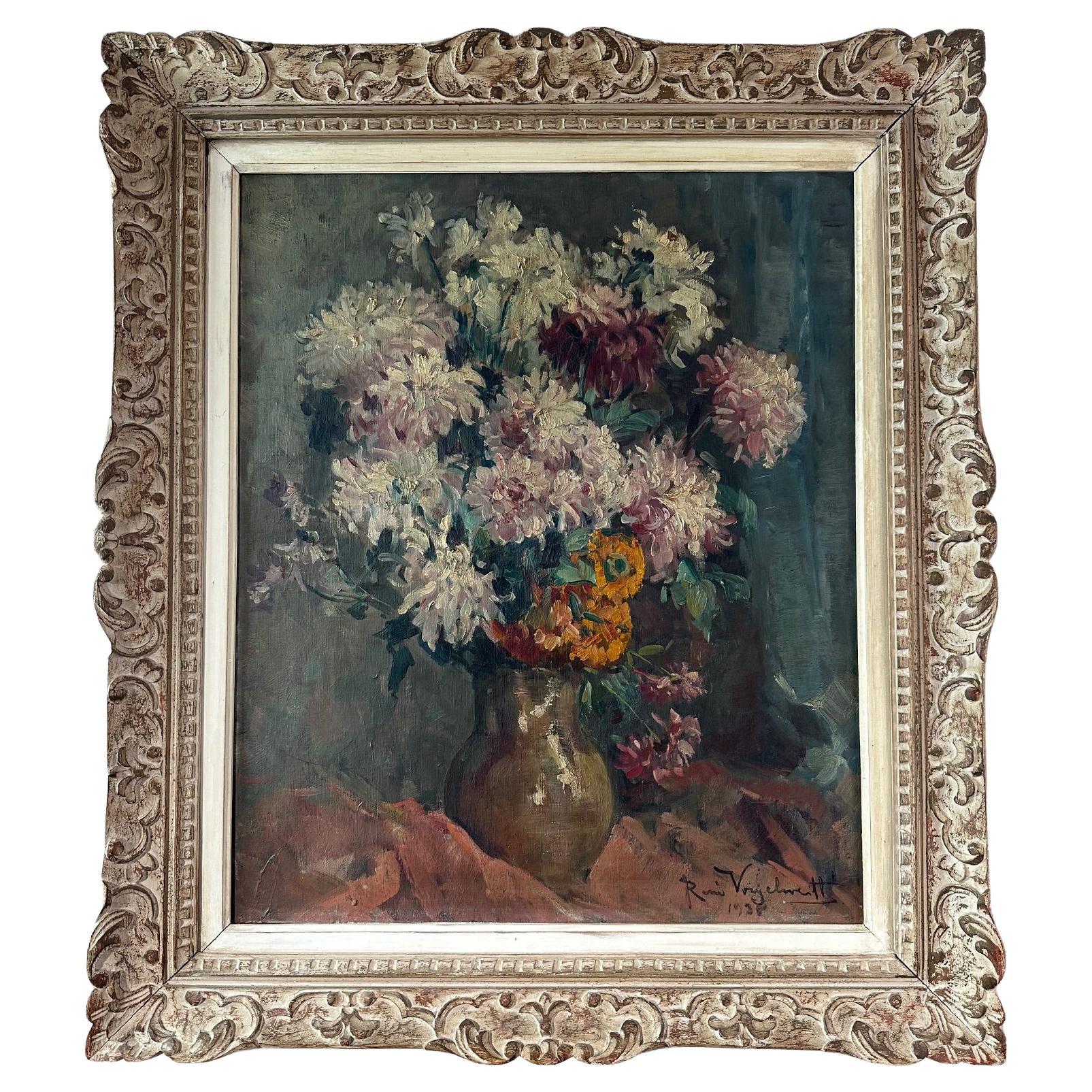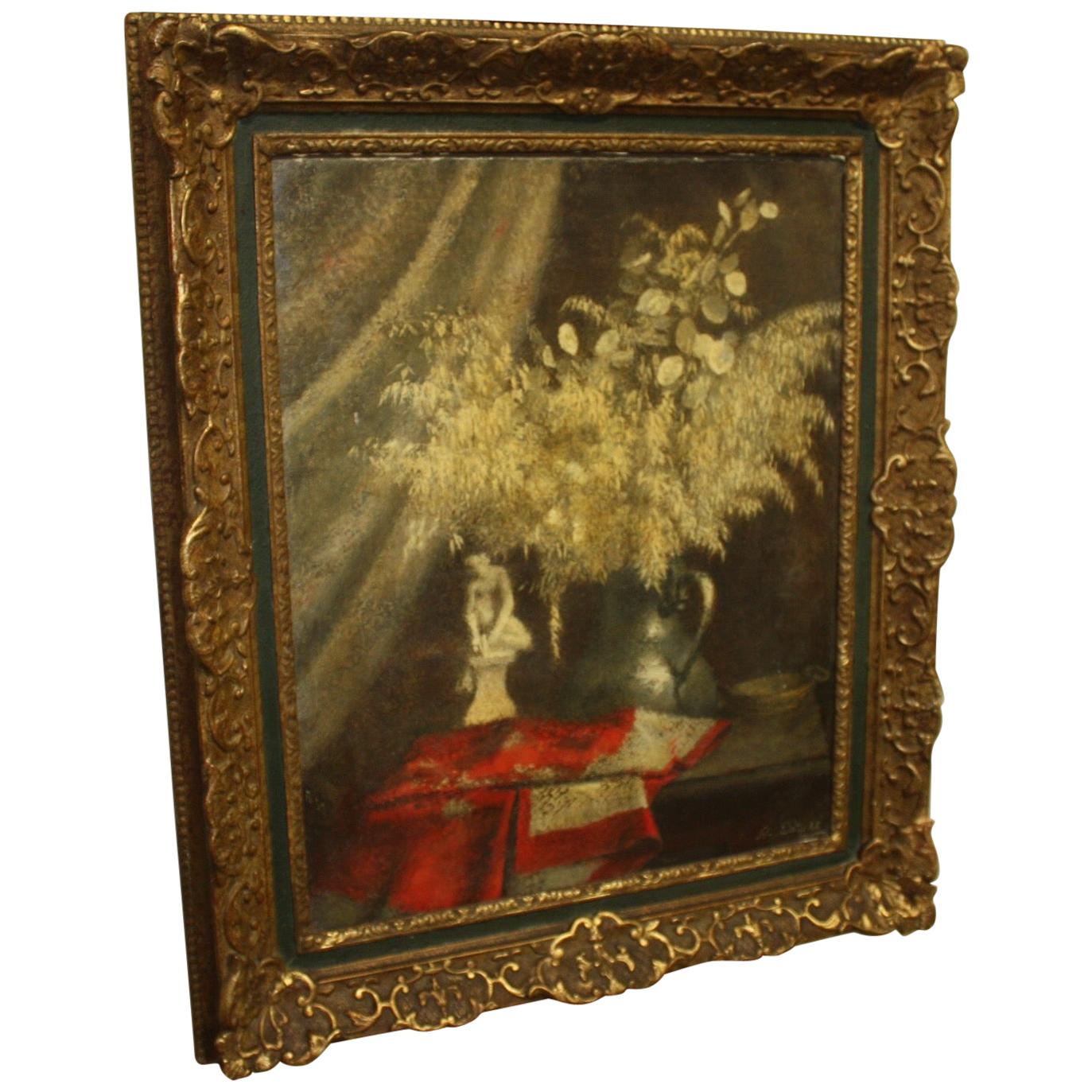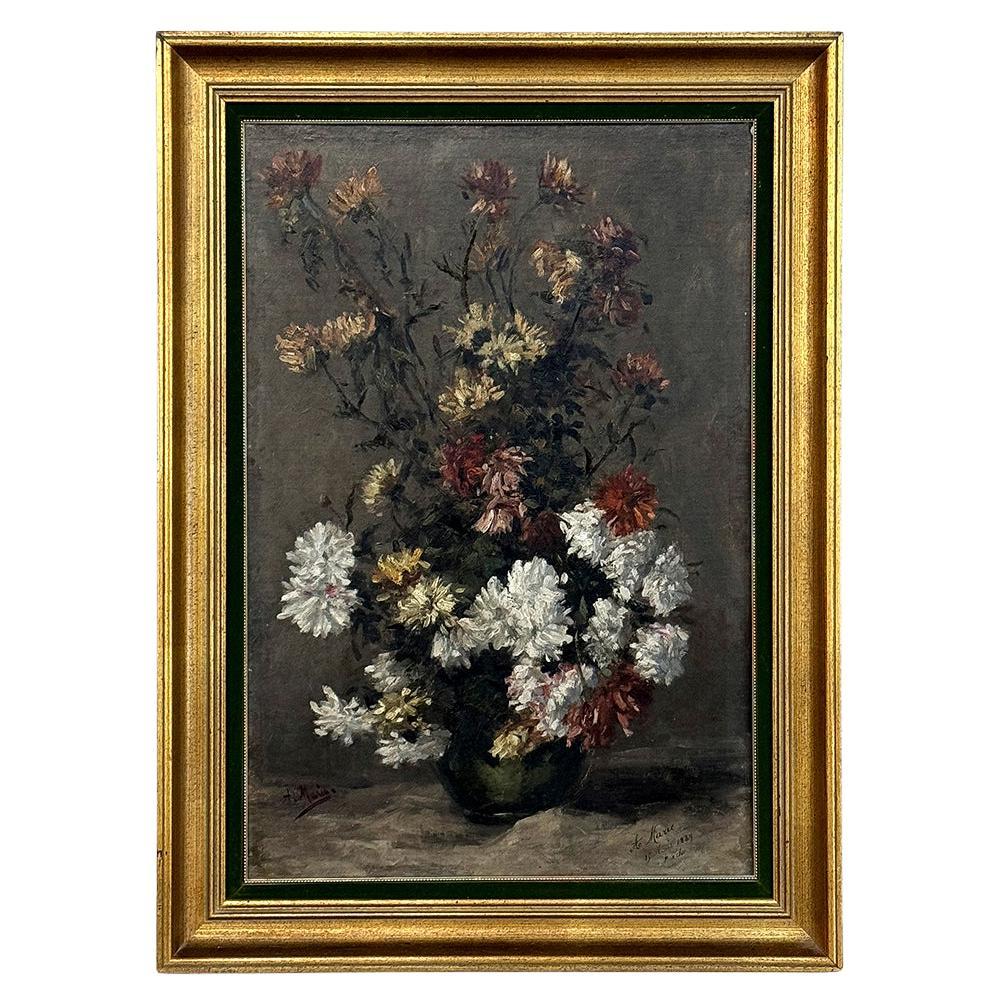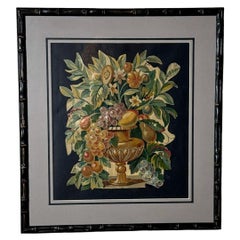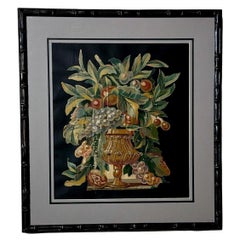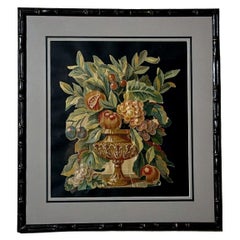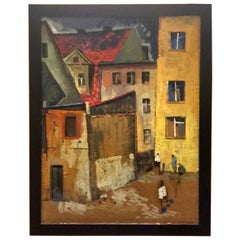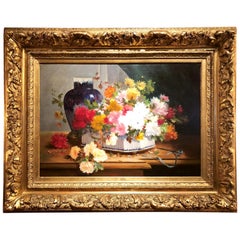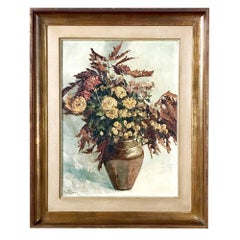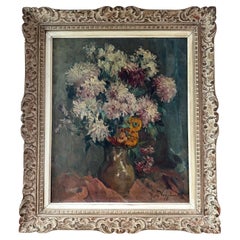Items Similar to Romantic French Oil on Canvas Painting
Want more images or videos?
Request additional images or videos from the seller
1 of 11
Romantic French Oil on Canvas Painting
$2,032.10
£1,523.18
€1,720
CA$2,791.76
A$3,116.74
CHF 1,633.12
MX$38,151.90
NOK 20,740.67
SEK 19,555.82
DKK 13,093.27
Shipping
Retrieving quote...The 1stDibs Promise:
Authenticity Guarantee,
Money-Back Guarantee,
24-Hour Cancellation
About the Item
We kindly suggest you read the whole description, because with it we try to give you detailed technical and historical information to guarantee the authenticity of our objects.
20th Century romantic French oil on canvas painting signed F.Pauwels. Painted between 1947 and 1948. Measures cm.93x78 x5 with wood frame measures canvas cm. 60x75. For all our shipments we use special packaging materials (wooden crates, styrofoam, etc.) for maximum protection and safety of the objects.
- Dimensions:Height: 36.62 in (93 cm)Width: 30.71 in (78 cm)Depth: 1.97 in (5 cm)
- Style:Romantic (Of the Period)
- Materials and Techniques:
- Place of Origin:
- Period:
- Date of Manufacture:1947-1948
- Condition:Wear consistent with age and use. Good condition.
- Seller Location:Prato, IT
- Reference Number:Seller: 2801stDibs: LU4632214619901
About the Seller
5.0
Platinum Seller
Premium sellers with a 4.7+ rating and 24-hour response times
Established in 1977
1stDibs seller since 2019
285 sales on 1stDibs
Typical response time: <1 hour
- ShippingRetrieving quote...Shipping from: Prato, Italy
- Return Policy
Authenticity Guarantee
In the unlikely event there’s an issue with an item’s authenticity, contact us within 1 year for a full refund. DetailsMoney-Back Guarantee
If your item is not as described, is damaged in transit, or does not arrive, contact us within 7 days for a full refund. Details24-Hour Cancellation
You have a 24-hour grace period in which to reconsider your purchase, with no questions asked.Vetted Professional Sellers
Our world-class sellers must adhere to strict standards for service and quality, maintaining the integrity of our listings.Price-Match Guarantee
If you find that a seller listed the same item for a lower price elsewhere, we’ll match it.Trusted Global Delivery
Our best-in-class carrier network provides specialized shipping options worldwide, including custom delivery.More From This Seller
View AllPainting Cutout Oil On Canvas Framed With Faux-Bamboo Wood -03
Located in Prato, Tuscany
We kindly ask that you read the entire description, as we strive to provide comprehensive technical and historical details to ensure the authenticity of our items. This frame encloses a canvas cutout from an antique oil painting and is particularly unique and distinctive. It was recently crafted by a Florentine Master cabinetmaker whose workshop is located in the most charming and vibrant district of Florence, San Frediano, renowned for its artisan shops that produce entirely handmade works. The Master used carved and shaped wood to replicate the appearance of bamboo, employing a technique known as "faux bamboo." This process involves using durable woods, such as maple or oak, that are intricately carved and then painted to achieve the desired effect. The "faux bamboo" technique has a history that dates back several centuries and gained significant popularity during the 18th and 19th centuries in Europe and America, eras marked by a fascination with exotic and Oriental design influences. This technique was particularly associated with the Chinoiserie style, an artistic movement inspired by Chinese art and aesthetics. At the time, real bamboo furniture...
Category
Antique Late 18th Century French Rococo Paintings
Materials
Canvas, Paper
Painting Cutout Oil On Canvas Framed With Faux-Bamboo Wood -01
Located in Prato, Tuscany
We kindly ask that you read the entire description, as we strive to provide comprehensive technical and historical details to ensure the authenticity of our items.
This frame encloses a canvas cutout from an antique oil painting and is particularly unique and distinctive. It was recently crafted by a Florentine Master cabinetmaker whose workshop is located in the most charming and vibrant district of Florence, San Frediano, renowned for its artisan shops that produce entirely handmade works. The Master used carved and shaped wood to replicate the appearance of bamboo, employing a technique known as "faux bamboo." This process involves using durable woods, such as maple or oak, that are intricately carved and then painted to achieve the desired effect. The "faux bamboo" technique has a history that dates back several centuries and gained significant popularity during the 18th and 19th centuries in Europe and America, eras marked by a fascination with exotic and Oriental design influences. This technique was particularly associated with the Chinoiserie style, an artistic movement inspired by Chinese art and aesthetics. At the time, real bamboo furniture...
Category
Antique Late 18th Century French Rococo Paintings
Materials
Canvas, Paper
Painting Cutout Oil On Canvas Framed With Faux-Bamboo Wood -02
Located in Prato, Tuscany
We kindly ask that you read the entire description, as we strive to provide comprehensive technical and historical details to ensure the authenticity of our items. This frame encloses a canvas cutout from an antique oil painting and is particularly unique and distinctive. It was recently crafted by a Florentine Master cabinetmaker whose workshop is located in the most charming and vibrant district of Florence, San Frediano, renowned for its artisan shops that produce entirely handmade works. The Master used carved and shaped wood to replicate the appearance of bamboo, employing a technique known as "faux bamboo." This process involves using durable woods, such as maple or oak, that are intricately carved and then painted to achieve the desired effect. The "faux bamboo" technique has a history that dates back several centuries and gained significant popularity during the 18th and 19th centuries in Europe and America, eras marked by a fascination with exotic and Oriental design influences. This technique was particularly associated with the Chinoiserie style, an artistic movement inspired by Chinese art and aesthetics. At the time, real bamboo furniture...
Category
Antique Late 18th Century French Rococo Paintings
Materials
Canvas, Paper
20th Century Munteanu Gheorghe Oil Painting
Located in Prato, Tuscany
We kindly suggest you read the whole description, because with it we try to give you detailed technical and historical information to guarantee the authenticity of our objects.
20th ...
Category
Late 20th Century Moldovan Modern Paintings
Materials
Wood
French Symbolic Expressionism Oil Painting Depicting French Revolution
Located in Prato, Tuscany
We kindly suggest that you read the entire description, as with it we try to give you detailed technical and historical information to ensure the authenticity of our objects. Painting oil painting on canvas is made with mixed technique brush and spatula; the author used traditional brushes for a first draft giving shape to the whole drawing with an expert, loose wrist play and with sure and decisive brushstrokes; the representation, in this case, is not a pure exercise of virtuosity, in fact, the author communicates us his intimate essence manifesting it through the language of colors, shapes, and composition. The artist finished his work with the technique of spatula painting, named after the protagonist's instrument, redistributing the colors densely and consistently, making the painting take on a special body and depth. The painting is signed but we are unable to give definite information about the author, however, we confirm its extraordinary aesthetic and engaging vividness; the painting was made in 1989 in the author's studio in Paris whose intentions were to celebrate the 200th anniversary of the French Revolution (1789). The painter was inspired by both French Expressionism and Symbolism; Expressionism exalts the emotional value of art; it is the artist's desire to communicate inner feelings, while with Symbolism, painters tend to go beyond the objective representation of reality to focus instead on the subjective vision, in which inner feelings, emotions, and experiences are evoked above all. Our painting is overflowing with the symbolism of the French Revolution; it is practically an evocative essence of it. This important and overwhelming historical event is powerfully present in the soul of the artist who wanted to overbearingly communicate to us his deepest emotions by transposing them entirely in the painting with strong and vivid colors, he did not want to simply allude or hint but to express, indeed "shout" his own deep interiority. In his intentions, the painting schematically and symbolically represents a standard-bearer of the French Revolution wearing the classic "Phrygian" hat. The author used only the three colors white, red, and blue that characterized the flags of the French Revolution; they were the new banners, which opposed the traditional emblem of the monarchy, the lilies on a white field. Three were the colors because three were the goals of the Revolution: liberty, equality, and fraternity, and they represented the three classes into which French society of the time was divided: the clergy (blue), the nobility (white), and the third state (red). The "Phrygian" cap (Latin for pileus) painted in red in the painting also has a high symbolic value, In Roman times it was worn by the " freedmen" to show that they were now freed slaves but in the French Revolution it became the very symbol of Liberty; a similar cap was worn by the freed Marseilles convicts in 1792, and was the symbol of the Jacobins during the French Revolution. Due to this fact, in addition to its historical meaning of freedom, it was later adopted as a symbol of the revolution itself, a symbol immortalized on the "Marianne," the very emblem of France, in Eugène Delacroix's famous painting "Liberty Leading the People...
Category
Late 20th Century French Modern Paintings
Materials
Canvas, Wood
Abstract Art French Oil Painting on Canvas, Wooden Frame We kindly invite you
Located in Prato, Tuscany
We kindly invite you to read the full description, as it provides detailed technical and historical information essential to ensuring the authenticity of our pieces.
This is an oil p...
Category
Late 20th Century French Modern Paintings
Materials
Canvas, Wood
You May Also Like
Antique French Oil on Canvas
Located in New Orleans, LA
This floral still life was painted by Charles Gilbert Martin (1839-1905). It is signed in the lower right corner.
Category
Antique Late 19th Century French Paintings
Materials
Canvas
$21,600
Early 20th century French Oil on Canvas Signed Delornage, 1906s
Located in LEGNY, FR
Oil on canvas from 1906 signed Delornage in good condition. Signature visible on the canvas. Perfect for art lovers or anyone looking for an authentic piece to enhance their interio...
Category
Antique Early 1900s French Paintings
Materials
Canvas
Antique Framed Oil Painting on Canvas by Wellens
Located in Dallas, TX
Antique framed oil painting on canvas by Wellens is a stunning still life work, with amazing technique in coloration, texture and composition. Wellens has used a variety of applicati...
Category
Mid-20th Century Belgian Expressionist Paintings
Materials
Canvas
20th century French Oil on Canvas signed René Vogelweith, 1938s
Located in LEGNY, FR
Very beautiful oil painting on canvas signed by the French artist René Vogelweith (1881-1950) representing a large bouquet of flowers. Made in 1938. Very beautiful frame in molded an...
Category
Vintage 1930s French Paintings
Materials
Canvas, Wood
Early 20th Century French Oil Painting
Located in Stockbridge, GA
Early 20th century French oil painting, signed "H. Dezire".
Category
Early 20th Century French Paintings
Materials
Canvas
19th Century Framed Oil Painting on Canvas by A. Marie dated 1889
Located in Dallas, TX
19th Century Framed Oil Painting on Canvas by A. Marie dated 1889 is an unusual still life, glorifying the natural beauty of wildflowers as opposed to a meticulously arranged bouquet...
Category
Antique 1880s French Expressionist Paintings
Materials
Canvas, Giltwood
More Ways To Browse
Vintage Safety Sign
Antique Roman Oil Painting
Italian Violin
Jaime Parlade
Montparnasse Frame
19th Century Chinese Rice Paper Paintings
China Trade Watercolours
Cy Twombly Furniture
Diego Rivera Signed
Porcelain Signs Oil
Tokyo Pop Furniture
Byron Galvez
Frederick Edward
Mark Levin
Mayflower Furniture
Vintage Wooden Soldier
Chinoiserie Oil Painting
Cusco School
